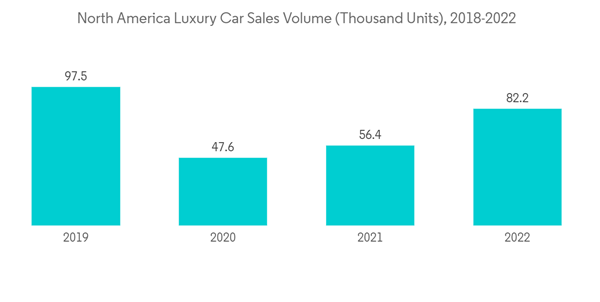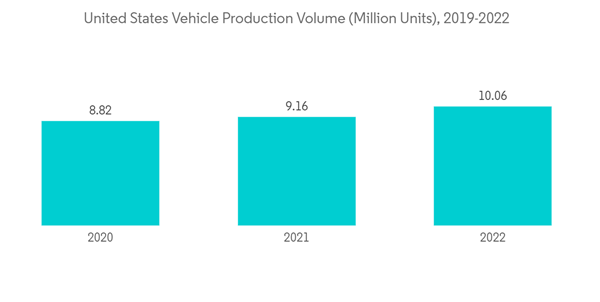Over the long term, with the growing demand for accuracy, automotive navigation technology helps in tracking and forecasting supply chains by including applications that provide a real-time-definite delivery system. Moreover, Car sharing services heavily rely on navigation-based technology as a result Ola, Uber, and Grab are expected to push the market growth.
Real-time traffic data, map updates, and smartphone integration have been a few primary features of an automotive navigation system that are likely to attract significant customer demand over the coming years. Further, technological advancements in the navigation system are expected to drive the demand for the navigation systems market during the forecast period.
The automotive industry’s recent shift in attention to technical developments such as electrification and autonomous driving has raised the demand for navigation systems. Several key players are focusing on expanding their navigation system functionalities with growing technologies, like AI (artificial intelligence) and AR (augmented reality), to capture the increasing demand for advanced navigation systems in vehicles.
North America Automotive Navigation System Market Trends
Passenger Car Hold Major Market Share
The primary features of an automotive navigation system are to integrate real-time data, map updates, and smartphone integration. With the growing accessibility to the internet through mobile phones, manufacturers are opting for all built-in functions of an in-vehicle GPS in the user smartphone system itself while keeping the costs low.An increase in disposable income and technological innovation drives growth in the market studied. The significant increase in the number of luxury vehicles and the decrease in consumer preference for sedans and SUVs have boosted the global demand for passenger cars and their premium amenities.
Furthermore, in response to growing environmental concerns and rising gasoline prices, top automobile manufacturers are launching electrified models of their vehicles. This will also aid in the expansion of the market studied.
Owing to the increased demand for passenger cars and the growing awareness of electric mobility, major players are planning to offer different types of new features in their present fleet to attract customers. For instance:
In November 2022, Hyundai Motor Company introduced the specifications of its seventh-generation Grandeur flagship sedan. The all-new Grandeur is the first model to adopt Connected Car Navigation Cockpit (ccNC), Hyundai Motor’s new infotainment system.
General Motors has made a significant announcement that all of their passenger cars will be electrified by 2035, which is a major step towards electric vehicles. With this electrification, it is expected that there will be an increase in the provision of information required for navigation, such as guidance to charging locations.
However, the current mainstream of automobile manufacturers in North America is to install display audio (DA) systems, excluding navigation functions. It is also expected that the current mainstream display audio systems with smartphone linkage functions will continue to be used for the time being.
The demand for navigation systems is growing in demand, especially amongst ride-hailing apps which are expected to push the market. GPS navigation has become a crucial aspect of taxi fleet management, allowing for easier tracking and calculation of accurate vehicle position. GPS systems have become important for many businesses to improve control, safety, and communication.
With the above-mentioned development across the region the demand for navigation system is likely to grow in the coming years.
United States Dominating the Market
Automotive mapping and navigation technology is becoming one of the most significant aspects of the contemporary automobile. Developers now have access to a lot of navigation data that can be used to enhance not just the human driving experience but also to improve ADAS capabilities and build autonomous cars.However, despite being a basic pre-installed program in the vehicles, Google Maps was the top downloaded map and navigation app in the United States in 2022. Waze came in second, with 9.12 million downloads during the period under consideration.
Further, long-standing GPS concerns such as multipathing are being addressed, and location data is also being used to create the finest quality 3D maps yet produced. OEMs, on the other hand, must continue to spend on building their own integrated systems as a key source of brand identity.
Moreover, with the introduction of 5G technology, the automobile sector is going to undergo tremendous change. The 5G mobile network standard will enable whole new capabilities in vehicles and elsewhere. It will pave the way for future mobility and autonomous driving, as well as improved multimedia and entertainment capabilities in automobiles.
Further partnering with companies like Microsoft leverage companies to integrate services like google maps, on-road assistance, music and many more often led to offer a bundled product at affordable price.
Further automakers in the country are investing in the latest technology to make the vehicle future-ready and provide best driving experience to the customers, For instance,
- In March 2022, General Motors introduced new in-vehicle technology, this will integrate Google’s Voice Assistant, Navigation, and App Ecosystem. Hence, technological advancement is expected to drive the automotive navigation system in North America.
North America Automotive Navigation System Industry Overview
North America Automotive Navigation System Market is dominated by several key players such as Denso Corporation, Robert Bosch GmbH, TomTom International BV, Panasonic Holdings Corporation, and Others. The market remains ever-evolving with newer technology, favorable government regulations, and mergers and acquisitions of the players. For instance,- In June 2023, Rivian Automotive, Inc. acquired Swedish mapping business Iternio, which created the 'A Better Routeplanner' (ABRP) software. ABRP is an industry leader in EV trip planning, with a large EV driver community in both North America and Europe. Rivian and Iternio will continue to support and enhance ABRP as a standalone app, as well as incorporate ABRP's technology into Rivian's in-vehicle navigation system and the newly available trip planning experience in the Rivian mobile app.
- In January 2023, Quest Global collaborated with TomTom International BV to deliver next-generation digital cockpit solutions. The partnership will yield next-gen infotainment solutions with a variety of connectivity and advanced driver-assistance system (ADAS) features navigation systems and entertainment apps.
- In April 2022, Mapbox announced that it would launch in select Toyota and Lexus vehicles equipped with a next-generation multimedia system developed by Toyota Motor North America to bring a driving experience that exceeds customer expectations.
Additional Benefits:
- The market estimate (ME) sheet in Excel format
- 3 months of analyst support
This product will be delivered within 2 business days.










